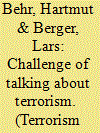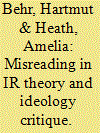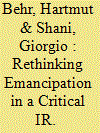|
|
|
Sort Order |
|
|
|
Items / Page
|
|
|
|
|
|
|
| Srl | Item |
| 1 |
ID:
091266


|
|
|
|
|
| Publication |
2009.
|
| Summary/Abstract |
The Arab "hegemonic debate" on the causes of Islamist terrorism nurtures (pan-) Arab, anti-Western sentiments and delegitimizes criticism of the political status quo. The European Union's emphasis on multilateral means of conflict resolution and trade promotion leads to official pronouncements that barely address the Arab world's domestic problems, instead referring to international tensions such as the Arab-Israeli conflict as a particular cause of Islamist terrorism and the need for cooperation with Arab governments. By failing to challenge the official narratives of authoritarian Arab regimes the EU obstructs interests in the democratization of the region and the delegitimization of Islamist violence.
|
|
|
|
|
|
|
|
|
|
|
|
|
|
|
|
| 2 |
ID:
077417


|
|
|
|
|
| Publication |
2007.
|
| Summary/Abstract |
International Relations benefits from historical comparative research. Although a historical comparative method can be fruitfully applied to the study of the European Union (EU), it is rarely undertaken. In this article, EU accession politics, particularly its 2004 enlargement, is compared with 19th century `standards of civilization' developed by European states concluding treaties with non-European nations. This article argues that EU accession politics operates in the legacies of 19th-century imperial rule. Understanding the EU in terms of an (new) empire might enrich the discussion of the perception and categorization of the EU as an international order.
|
|
|
|
|
|
|
|
|
|
|
|
|
|
|
|
| 3 |
ID:
077415


|
|
|
|
|
| Summary/Abstract |
International Relations benefits from historical comparative research. Although a historical comparative method can be fruitfully applied to the study of the European Union (EU), it is rarely undertaken. In this article, EU accession politics, particularly its 2004 enlargement, is compared with 19th century `standards of civilization' developed by European states concluding treaties with non-European nations. This article argues that EU accession politics operates in the legacies of 19th-century imperial rule. Understanding the EU in terms of an (new) empire might enrich the discussion of the perception and categorization of the EU as an international order.
|
|
|
|
|
|
|
|
|
|
|
|
|
|
|
|
| 4 |
ID:
088095


|
|
|
|
|
| Publication |
2009.
|
| Summary/Abstract |
This article is interested in the hegemony which neo-realism accomplished during the second half of the 20th century in both the academic field and policy making of I/international R/relations. Our examination posits the argument that neo-realism can be seen as an ideology rather than a theory of international politics. While this view can connect to individual voices from the 1960s as well as to an emerging body of critical literature since the 1990s, we propose an ideology critique to explore this argument. To unfold this approach we will elaborate some neo-realist misreadings which we think manipulate intellectual history (among others, the writings of Hans J. Morgenthau) and represent an ideological impact intrinsic in the development of IR. An ideology critical approach - which is inherent in Morgenthau's thoughts on international theory themselves and thus helps to reveal profound discrepancies at the heart of an ostensible 'realist'-neo-realist 'unity' - has, firstly, to problematise those discrepancies and, secondly, to focus on hegemonic strategies applied to ideologise and mainstream the academic field. The first part of such an agenda is what we present here; the second part is what we outline methodologically and suggest for further studies in, and of, IR.
|
|
|
|
|
|
|
|
|
|
|
|
|
|
|
|
| 5 |
ID:
182444


|
|
|
|
|
| Summary/Abstract |
This article seeks to reconceptualise emancipation in critically theorising International Relations (IR) by developing ‘thin’ and ‘thick’ versions of normativity and applying them as conditions for a pluriversal dialogue between different cosmologies. We start with the premise that ‘critical IR’ is both Eurocentric and a-normative, and argue that a normative engagement with critical discourses both inside and outside the West is necessary to recapture its emancipatory promise. Drawing on the work of Max Horkheimer, Herbert Marcuse and Jacques Derrida, we develop ‘thin’ and ‘thick’ versions of normativity. The former, we argue, operates as a critical corrective of thick normative positions, reclaiming their openness to difference, while not making substantive moral or political claims itself. We then apply these version of normativity to examine the possibility of a global pluriversal dialogue between different cosmologies. Cosmologies, we argue, refer to sets of ontological and epistemological claims about the human condition that are inherently normative. ‘Thin’ normativity applied to the ‘thick’ claims of cosmologies prevents the essentialisation and hierarchisation of cosmological difference(s) by revealing and de-constructing the latter’s potentially discriminatory, exclusionary, and violent tendencies. In so doing, it facilitates a global inter-cosmological dialogue which we regard as the objective of a post-western, critical IR.
|
|
|
|
|
|
|
|
|
|
|
|
|
|
|
|
| 6 |
ID:
077416


|
|
|
|
|
| Summary/Abstract |
International Relations benefits from historical comparative research. Although a historical comparative method can be fruitfully applied to the study of the European Union (EU), it is rarely undertaken. In this article, EU accession politics, particularly its 2004 enlargement, is compared with 19th century `standards of civilization' developed by European states concluding treaties with non-European nations. This article argues that EU accession politics operates in the legacies of 19th-century imperial rule. Understanding the EU in terms of an (new) empire might enrich the discussion of the perception and categorization of the EU as an international order.
|
|
|
|
|
|
|
|
|
|
|
|
|
|
|
|
|
|
|
|
|